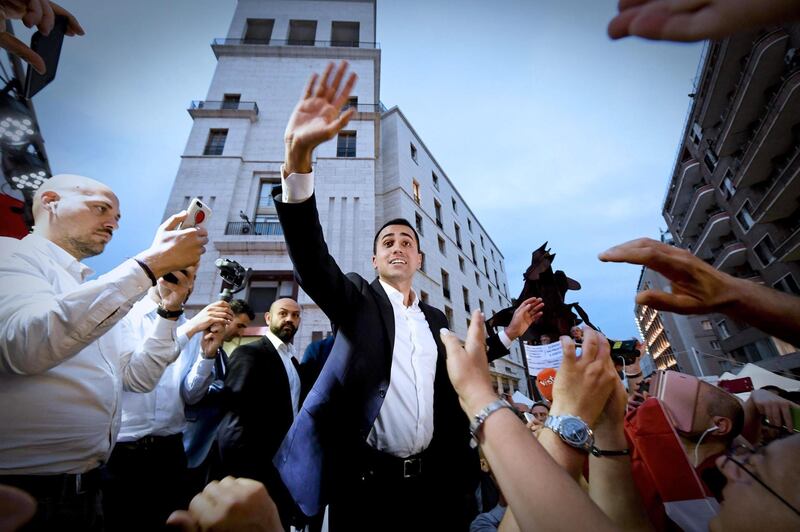Italian politics has for decades been seen abroad as more about theatre than policy. In the Cold War years, prime ministers changed with bewildering speed, brought down by scandal or political manipulation and yet the government remained the same.
More recently, Italy has given the world Silvio Berlusconi, its longest serving post-war prime minister, who is a precursor of Donald Trump: a mega-rich businessman whose provocative comments convinced a good part of the electorate that he was a man of the people.
All along, behind the political theatre, some of Italy’s best brains have served in the Treasury and Central Bank to manage the country’s ballooning debt and maintain the trust of foreign creditors. So while the state has never quite functioned as it should, life has continued.
So it is not surprising that Italy’s current political crisis did not immediately shake faith in the country’s credit. A further source of stability is what might be described in another country as the “deep state” which kicks into action if the politicians’ tendency to commit arson with the public finances gets out of hand.
This was most clearly seen in 2011 when the scandal-hit Mr Berlusconi was replaced by Mario Monti, an economist and former European Commissioner. Technocratic caretaker prime ministers are part of the tissue of Italian politics.
This “deep state” is not made up of generals or the police. Since Italy’s adoption of the euro in 1999, its influence has filtered down from the president of the European Central Bank – who, as it happens, is currently an Italian, Mario Draghi – to the Italian president who, although a figurehead, has broad powers to nominate prime ministers and reject ministerial candidates.
The Italian political class does not resent this interference. Rather, it sees the euro – the guiding principle of which is German penny-pinching – as a necessary straitjacket to restrain the high-spending populist urges which saddled Italy with so much debt in the 1980s. The high taxes that Italians need to pay are now blamed on the Brussels and Germany, leading to an ever rising tide of anti-European Union feeling.
This culminated in the March elections when the political centre was crushed by an unruly majority of Eurosceptic parties, including the upstart anti-establishment Five Star Movement, which is strong in the impoverished south and the far-right League, originally a separatist movement based in the wealthier north.
Despite their obvious incompatibility – the League insisted on cutting taxes while Five Star wanted an impossibly costly guaranteed income for all – they got close to forming a government. But the Italian President Sergio Mattarella vetoed the appointment of a renowned opponent of Italy’s euro membership, Paolo Savona, as finance minister.
Mr Mattarella said the appointment would endanger the savings of Italians by causing a sell-off of Italian bonds and was unjustified because the issue of leaving the euro had not been in the parties’ manifestos.
The governor of the Italian central bank, Ignazio Visco, weighed in with a dramatic warning that "we are only ever a few steps away from the very serious risk of losing the irreplaceable asset of trust" with the country's creditors.
The thwarted populist parties blamed the unholy trinity of Brussels, Berlin and the bond markets for the collapse of their government. The president promptly proposed someone who looks like the dream candidate of the "deep state", former International Monetary Fund economist Carlo Cottarelli, as caretaker prime minister.
But this choice of a globally minded technocrat is so out of tune with the way the Italians voted that it seems unlikely he could ever be approved by parliament, an impasse which might have to be broken by new elections as early as July.
There is widespread speculation that League leader Matteo Salvini insisted on the choice of Mr Savona in the hope of provoking early elections. The opinion polls suggest he would do even better than in March. The leftist former prime minister Massimo D’Alema predicted in an unguarded moment that a League-Five Star alliance could win 80 per cent of the vote in a snap election.
For the rest of Europe, that would mean the barbarians had breached the walls of Rome.
In any case, the old way of doing things has run its course. Italy has been stuck in low growth for years and its brightest young people are all leaving.
French President Emmanuel Macron's grand plans for completing the half-built edifice of the euro are going nowhere. The systemic instability caused by Italian politics will only increase the reluctance of northern European states such as Germany and the Netherlands to take responsibility for the debts of more profligate countries.
Will Italy ever leave the euro? Joining it is a one-way street: there is no mechanism for quitting and no one has ever done so. It was mooted during the Greek crisis but that is a much smaller economy than Italy’s –the third largest in Europe and the eighth in the world.
The consequences of leaving would be huge, not only for banks around the world but also for Italian savers and taxpayers.
At this stage, 59 per cent of Italians are still in favour of the euro. If the League and Five Star actually form a government or fight a new election, they will need to clarify their policies on the euro. Do they want to bring the whole edifice crashing down?
They may heed the lesson of the National Front in France, which alienated some of its risk-averse voters by calling for exit from the euro.
Or maybe they are more interested in remaking Italian politics and showing Brussels and Berlin that Italy’s concerns can no longer be ignored by its EU partners. In any case, the trend of Italian politics is now firmly set for confrontation with the EU on the core issues of fiscal discipline and migration.
Alan Philps is editor of The World Today, the Chatham House magazine of international affairs





